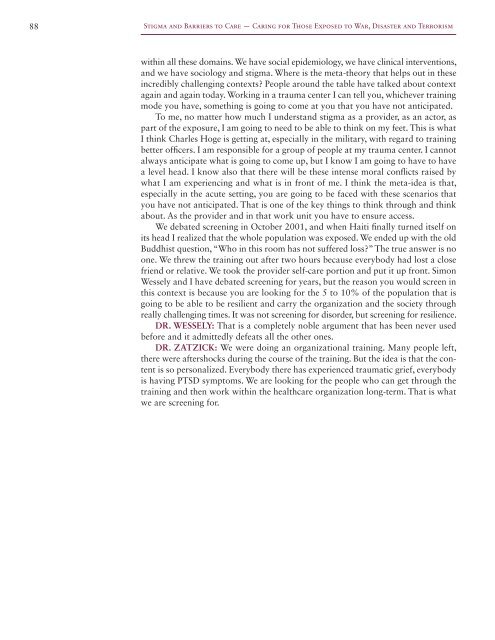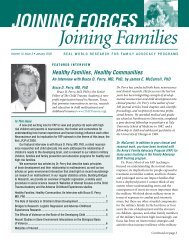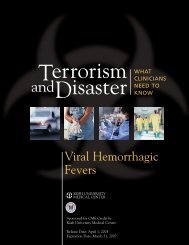stigma and barriers to care - Uniformed Services University of the ...
stigma and barriers to care - Uniformed Services University of the ...
stigma and barriers to care - Uniformed Services University of the ...
Create successful ePaper yourself
Turn your PDF publications into a flip-book with our unique Google optimized e-Paper software.
88<br />
Stigma <strong>and</strong> Barriers <strong>to</strong> Care — Caring for Those Exposed <strong>to</strong> War, Disaster <strong>and</strong> Terrorism<br />
within all <strong>the</strong>se domains. We have social epidemiology, we have clinical interventions,<br />
<strong>and</strong> we have sociology <strong>and</strong> <strong>stigma</strong>. Where is <strong>the</strong> meta-<strong>the</strong>ory that helps out in <strong>the</strong>se<br />
incredibly challenging contexts People around <strong>the</strong> table have talked about context<br />
again <strong>and</strong> again <strong>to</strong>day. Working in a trauma center I can tell you, whichever training<br />
mode you have, something is going <strong>to</strong> come at you that you have not anticipated.<br />
To me, no matter how much I underst<strong>and</strong> <strong>stigma</strong> as a provider, as an ac<strong>to</strong>r, as<br />
part <strong>of</strong> <strong>the</strong> exposure, I am going <strong>to</strong> need <strong>to</strong> be able <strong>to</strong> think on my feet. This is what<br />
I think Charles Hoge is getting at, especially in <strong>the</strong> military, with regard <strong>to</strong> training<br />
better <strong>of</strong>ficers. I am responsible for a group <strong>of</strong> people at my trauma center. I cannot<br />
always anticipate what is going <strong>to</strong> come up, but I know I am going <strong>to</strong> have <strong>to</strong> have<br />
a level head. I know also that <strong>the</strong>re will be <strong>the</strong>se intense moral conflicts raised by<br />
what I am experiencing <strong>and</strong> what is in front <strong>of</strong> me. I think <strong>the</strong> meta-idea is that,<br />
especially in <strong>the</strong> acute setting, you are going <strong>to</strong> be faced with <strong>the</strong>se scenarios that<br />
you have not anticipated. That is one <strong>of</strong> <strong>the</strong> key things <strong>to</strong> think through <strong>and</strong> think<br />
about. As <strong>the</strong> provider <strong>and</strong> in that work unit you have <strong>to</strong> ensure access.<br />
We debated screening in Oc<strong>to</strong>ber 2001, <strong>and</strong> when Haiti finally turned itself on<br />
its head I realized that <strong>the</strong> whole population was exposed. We ended up with <strong>the</strong> old<br />
Buddhist question, “Who in this room has not suffered loss” The true answer is no<br />
one. We threw <strong>the</strong> training out after two hours because everybody had lost a close<br />
friend or relative. We <strong>to</strong>ok <strong>the</strong> provider self-<strong>care</strong> portion <strong>and</strong> put it up front. Simon<br />
Wessely <strong>and</strong> I have debated screening for years, but <strong>the</strong> reason you would screen in<br />
this context is because you are looking for <strong>the</strong> 5 <strong>to</strong> 10% <strong>of</strong> <strong>the</strong> population that is<br />
going <strong>to</strong> be able <strong>to</strong> be resilient <strong>and</strong> carry <strong>the</strong> organization <strong>and</strong> <strong>the</strong> society through<br />
really challenging times. It was not screening for disorder, but screening for resilience.<br />
DR. WESSELY: That is a completely noble argument that has been never used<br />
before <strong>and</strong> it admittedly defeats all <strong>the</strong> o<strong>the</strong>r ones.<br />
DR. ZATZICK: We were doing an organizational training. Many people left,<br />
<strong>the</strong>re were aftershocks during <strong>the</strong> course <strong>of</strong> <strong>the</strong> training. But <strong>the</strong> idea is that <strong>the</strong> content<br />
is so personalized. Everybody <strong>the</strong>re has experienced traumatic grief, everybody<br />
is having PTSD symp<strong>to</strong>ms. We are looking for <strong>the</strong> people who can get through <strong>the</strong><br />
training <strong>and</strong> <strong>the</strong>n work within <strong>the</strong> health<strong>care</strong> organization long-term. That is what<br />
we are screening for.




